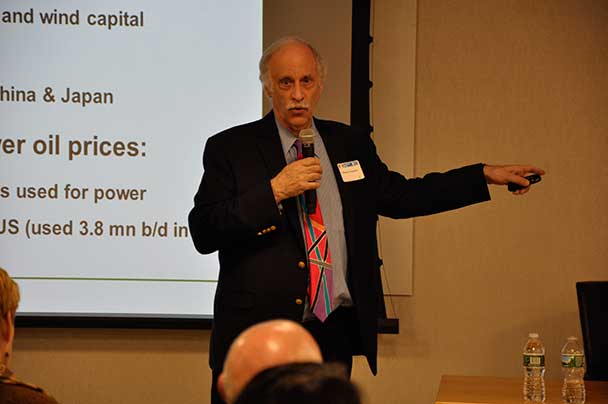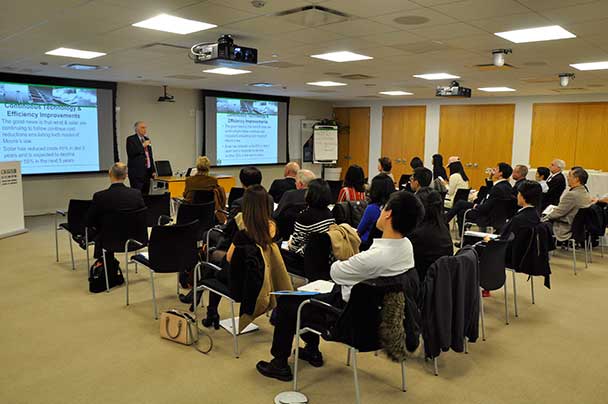As employment in fossil fuel declines, clean energy emerges as a leading job-creating industry
The United States and China will lead the world in developing clean energy, says a global expert on energy and environment.

Peter C. Fusaro, Chairman of the energy and environmental consulting firm Global Change Associates, said China and the United States will be natural leaders in the drive to produce sustainable energy given the size of their economies and the spirit of entrepreneurship in the two countries. Moreover, adopting sustainable energy creates jobs.
Speaking in New York at a special edition of Knowledge Series events hosted by the Cheung Kong Graduate School of Business, Mr. Fusaro said that just as American policy-makers responded to public demand for cleaner environment, adopting regulations such as mandating the sale of unleaded fuel; China’s policy-makers and entrepreneurs are rising to the challenge.
“It took time to clean the problem in the US,” Mr. Fusaro said. “(But) in China the process is happening faster than it did in the US.”
This is well reflected in how China and the United States are leading the world in investment to develop clean energy technology. China and the US are working bilaterally to reduce their greenhouse gas (GHG) emissions. The United States, Mr. Fusaro said, has reduced its GHG emissions the most in the world; and China is implementing a five-year plan to reduce coal burn to 67% by 2017 and will continue to do further to achieve emissions reduction.
“The United States and China are number one and two GHG polluters and number one and two investors in clean energy,” he told the New York audience that comprised of influencers and professionals in the US and Greater China.
That the two countries produce the world’s greatest emission is not surprising given that the United States and China are the world’s largest and among the most dynamic economies.
In total, energy is the world’s largest industry totaling more than US$6 trillion. Clean energy occupies a small fraction of this industry. Mr. Fusaro said that data by BNEF shows clean energy is 5%, about $287.5 billion, of the global energy industry.
However, clean energy sectors are leading job creators. Solar energy has hired 250,000 people. In 2016, solar industry added 51,000 jobs. Overall, since 2012 employment in the sector has doubled. Recently, while employment in solar energy grew 6%, it declined 18% in upstream oil and gas. Panel installations and maintenance alone create tens of thousands of jobs. Mr. Fusaro expects China to experience similar job creation trends.
Interestingly, while efficiency leads to job cuts in fossil fuel energy, it leads to job creation in clean energy because it ferments increased investment and interest.

What will fuel, pun intended, further growth of clean energy is the demand by consumers. “Sustainability is in the DNA of the young and 52% of the world’s population is under 30,” Mr. Fusaro said. He cited the trend toward car sharing from car ownership.
The Knowledge Series events held at the school’s state-of-the-art New York learning center in Manhattan discuss critical and current business issues impacting China and global business.
“Energy is at the core of all economic activities and we may be at the crust of a revolutionary transition in this industry. This is why we thought it was important to bring a leading thought leader to discuss the emerging factors in energy and environmental financial markets,” said Mary Wadsworth Darby, Chief Representative of CKGSB (Americas).